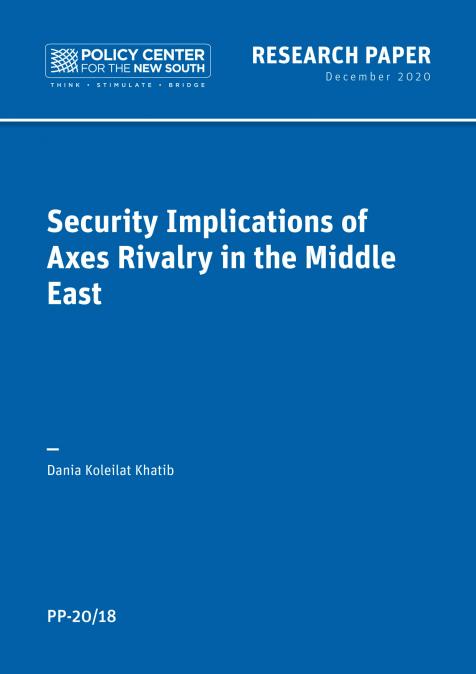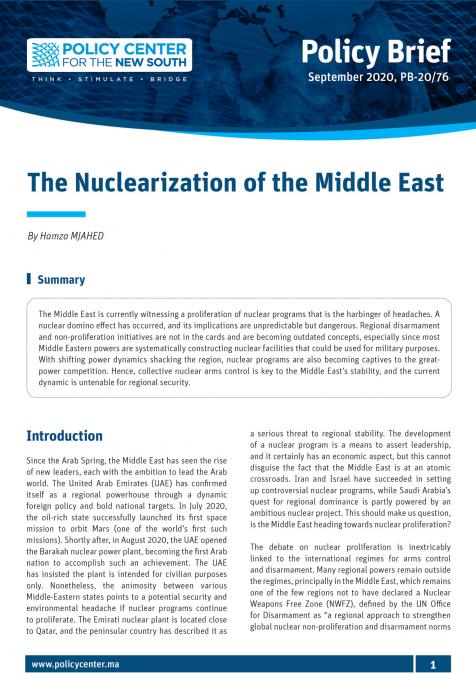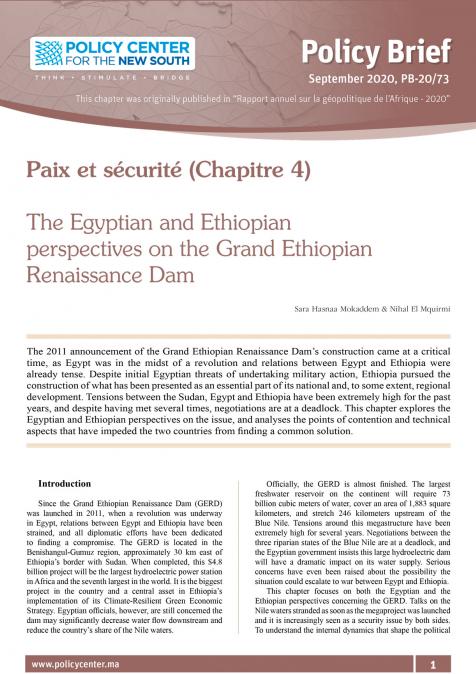Publications /
Opinion
One week ago, Bahrain has hosted the "Peace to Prosperity" workshop to discuss what the United States has described as the economic part of President Donald Trump's "deal of the century", his proposal for solving the Israeli-Palestinian conflict. The Palestinian leadership boycotted the meeting on June 25 and 26 in Manama, leading critics to question the credibility of the event.
Below is an international press review of events preceding the workshop by Helmut Sorge, former Foreign correspondent, Foreign editor, and Middle East expert for Germany's leading newsmagazine "Der Spiegel".
“Not a peace agreement, but Palestinian surrender”
The visit was of historic proportion, dramatic for some, emotional for others. Yasser Arafat, the chairman ofthe Palestinian Liberation Organization, the symbol of the Palestinian revolution, a spirit of hope for millions of dispersed and oppressed Palestinian refugees, a determined enemy of the Jewish State, Israel, entered the world of global politics, the United Nations, New York City. On this November morning of 1974 Arafat, his bolding head covered by a traditional headscarf, the checkered keffiyeh, insisted in his-speech to the UN General Assembly that he had “come bearing an olive branch and a freedom fighter's gun (although he had been disarmed by security prior to entering the UN building). Do not let the olive branch fall from my hand I repeat: Do not let the olive branch fall from my hand.”
More than four decades later, after never-ending tensions, harsher oppression, more battles and rocket exchanges, the olive branches certainly have dried off, the tree of hope is dead. The guns are still loaded, bombs delivered, children buried. The Nobel Peace Prize, handed to Yasser Arafat, and Israeli leaders Simon Perez and Yitzhak Rabin in 1994, has diminished to an artifact, an historic object. Peace in Palestine seems as removed as antiquity. 2.6 million Palestinians are now existing in the Israeli occupied West Bank for more than half a century, deprived of freedom and sovereignty, and almost two million are living in dusty, damaged Gaza, considered by Human Rights Organizations as “the largest open-air prison of the world.”
“For Israeli citizens only”
80 percent of Gaza’s people depend on humanitarian aid. For Hagai El-Ad, executive director of B’Tselem, the Israeli Information Center for Human Rights in the occupied territories , the West Bank has “become an archipelago of Palestinian Bantustans, surrounded by settlements,walls and check points, subject to a mix of state and settler violence.” An estimated 705 permanent obstacles such as checkpoints are in use, some major roads are authorized for Israeli citizens only. In the West Bank Palestinians are pushed back, their houses demolished, their land confiscated, because Israel needs space for its people, often orthodox Jewish migrants, arriving from the US, settlers, ready to live the Zionist dream of Eretz Israel, the myth of the biblical nation reaching from the Jordan river to the Mediterranean Sea. During the last quarter of 2018 Israeli authorities advanced, approved or tendered more than 3100 housing units planned for settlements, nearly half of which are planned deep in the West Bank. 630 000 Jews are already housed on Arab land, illegally by international law, condemned by the United Nations.
Until Donald Trump was elected President of the United States, there has been a feeling of hope, shadowed by doubt- the two-state solution. A state of Palestine. Peaceful neighbor of Israel. A member of the world community. Free. Democratic. Borders to pass, an airport, a harbor or two or three, unrestricted fishing, a world which allows dreams, an education, a future. Dignity. Now, alas! Another chapter is written, by Washington. The “secret plan”, Trump had suggested since he was sworn into office, revolutionary new thoughts, which would end hatred and war between Israeli and Palestinians forever— June 25th the Trump administration wanted to reveal, in Bahrain, the “deal of the century”, the solution of all solutions . No, no, Trump’ s son in law, an orthodox Jew, cautioned, the participants of the conference would not discuss a banal subject - the two state solution. The participants of the “workshop” would talk mainly about money, trying to entice the Palestinians to accept billions in exchange for a different political reality: no Palestinian State, no Palestinian capital Jerusalem. Just illusions. Qatar, Saudi Arabia, the United Arab Emirates apparently are willing to finance a pro-Israeli political plan, unacceptable for the Palestinian leadership for whom the Trump-offer is not reality, but “the deal of the next century (Chief Palestinian negotiator Saeb Erekat)
Apparently, the controversial political plan will not be discussed in Bahrain, since Mr. Netanyahu, who failed to form a new coalition government a few months ago, will face national elections on September 17. And Mr. Trump, stated the New York Times (June 4, 2019), eager not to alienate evangelic voters or influential pro-Israel donors like casino magnate Sheldon Adelson,” is unlikely to present a plan that would put Israel or Mr. Netanyahu in an awkward position. ” Therefore, Palestine’s political future will be revealed at the earliest in November since any new Israeli n coalition probably could not be formed until at least October. Palestine has no priority for Trump, just Israel, and his Jewish, financial, supporters. They pushed him to cancel the Iran deal, they demanded the recognition of Jerusalem, all of the city as capital of Israel, they play with the thought of annexation of the occupied areas, at least some, important portions of it. Not a two-state solution is a la mode, the one state - Israel. Palestinians as second class citizens, or expelled, pushed, enticed to move to neighboring Jordan, or Lebanon, or Syria where the war has created empty spaces.
“Trying to strangle a woman while giving her a manicure”
Big bucks, billions, and autonomy, that’s all Palestinians will be offered. A luxurious mouse traps. Yes, billions, for the deprived, oppressed Palestinians, which in the future would live in Hollywood splendor. Keep dreaming baby. Palestinian entrepreneurs have been invited to the conference; many have refused to attend. Speaking to the “Washington Post” (22 may 2019) an American Palestinian business man described the invitation as a “blatant payoff” and likened Kushner’s offer to invest to “trying to strangle a woman while giving her a manicure. "Strange, yet not really surprising judging by the turbulent, impulsive Foreign policy of the Trump administration, Washington did not consult or even inform the Palestinian leaders, of the Bahrain conference, as Saeb Erekat, secretary general of the PLO confirmed: “Attempts at promoting an economic normalization of the Israeli occupation of Palestine will be rejected. This is not about improving living conditions under occupation, but about reaching Palestine‘s full potential by ending the Israeli occupation.” And: “The Trump administration is not seeking a peace agreement, but a Palestinian declaration of surrender.” (“New York Times”, 24 may 2019).
“The abiding impression among Palestinians is that Trump and his lieutenants are not honest brokers”, stated Ishaan Tharoor in the “Washington Post”, instead they see a series of debilitating moves enacted by the administration, from the unilateral recognition of Jerusalem as Israel’s capital to cuts in Palestinian aid to the shuttering of diplomatic offices that cater to Palestinians - as part of a campaign to confirm Israelis hegemony and undermine political aspirations.” The United Nations have declared over and over again (since Israel occupied the 400 square miles of Syrian land in the Golan Heights in 1967), that official annexation of the territory would violate International law. Trump nevertheless encouraged his friend Bibi to grab the land. In a ceremony Israelis just changed the name of the Golan Heights to “Trump Heights.”
The Palestinians will not be bought - the conference has ended in failure, yet sold by Washington as a encouraging begin for an historic ending. A possible decision by the Israeli government, encouraged, at least tolerated, by Trump, to dare formal annexation of Palestinian land, occupied by thousands of settlers may follow. The argument: if the Palestinians do refuse billions of aid, rejecting improvement of their living conditions dramatically, they do not want peace! Netanyahu could continue to manage the status quo or make good on his election promise of annexation. In the national newspaper “Haaretz” an opinion poll published in march, confirmed that 42 percent of Israelis supported annexation of some portion of the West Bank, and just 34 percent are still in favor of a two state solution.
“God did not say anything about democracy”
It may be difficult to impossible for the Palestinian authorities accepting the so-called neutrality of Trump’s special Middle East advisor Jared Kushner, his son in law, whose family, particularly his father Charles, has supported Israels settler policy in the occupied land financially. “Haaretz” traced payments, tens of thousands of dollars, through their family foundation”. One of the key beneficiaries has been the “Friends of Bet EL Institutions”, the American fundraising arm of one of the West Banks more radical settlements. How can these Kushner’s insist not to be biased towards Israel? At least Sheldon Adelson, 85, does not pretend. The hotel and casino mogul’s wealth is estimated at 33 billion, not counting the newspapers he owns in his hometown Las Vegas and Israel: “I am a one issue person. And that issue is Israel.”
Adelson donated 25 million dollars to Presidential candidate Donald Trump, and supported the Republican Party with 65 million. Adelson, married to an Israeli medical doctor, who was born in Palestine in 1946, gave 140 million to the organization “Birthright Israel”, which finances Jewish youth trips to Israel. The imprint of Adelson’s passion is seen in an array of Donald Trump’s more controversial decisions, reported “The Guardian” (8th of June, 2018) including violating the Iran nuclear deal, moving the US embassy to Jerusalem, and appointing the ultra-hawkish John Bolton as National Security Advisor. Forever Jerusalem was on the billionaire’s mind, dreaming of the historic town as capital of Israel. Trump gave his generous supporter the promise, once elected President he would deliver! Adelman, who apparently was frequently on the phone to the White House, “consistently raised the topic in nearly all his phone calls and meetings with the President,” reported the Associated Press (December 7th, 2017). Trump kept his word.
Sheldon Adelson is not worried that Israel’s politicians are moving so far to the right that the democratic system is in jeopardy: “I think God did not say anything about democracy. He did not talk about Israel remaining as a democratic state.”
The opinions expressed in this blog post are the views of the author.









